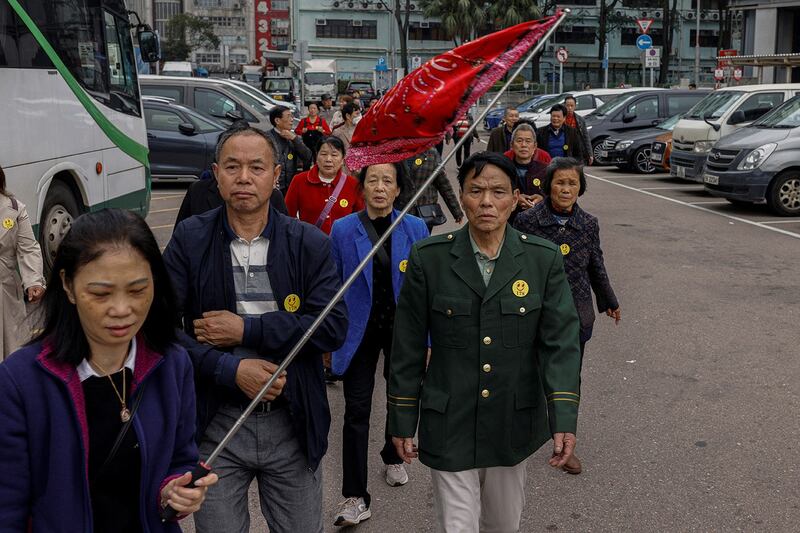Hong Kong's government announced on Thursday it will push ahead with stringent new security legislation known as "Article 23," aiming to pass it as soon as possible -- a process that could still take weeks.
"[Hong Kong] has to enact the Basic Law Article 23 legislation as soon as possible – the earlier the better," the city's leader John Lee said on Thursday. "Completing the legislative work even one day earlier means we can more effectively safeguard national security one day earlier."
Lee said he had written to the Legislative Council about the Safeguarding National Security Bill, which the government says will plug "loopholes" left by the 2020 National Security Law imposed on Hong Kong by Beijing in the wake of the 2019 protest movement.
In Hong Kong’s legislative process, three readings are necessary to pass a bill, so it may still take weeks to approve. After a first and second reading, the council will set up a committee to scrutinize the bill, after which it will be introduced to the general meeting for a vote on subsequent Wednesdays.
The law will criminalize "treason," "insurrection," the theft of "state secrets," "sabotage" and "foreign interference," among other national security offenses, and is highly likely to be passed by the Legislative Council in the absence of opposition lawmakers.
But rights experts including the U.N. Special Rapporteur for Human Rights Defenders, foreign governments and activists have warned that the law will criminalize actions like peaceful protest or political opposition that should be protected under international law.
The announcement came after lawmakers discussed the bill for most of Thursday, with some expressing concerns that the law could be used to curb public speech or the media.
Insulting mainlanders
Justice Secretary Paul Lam appeared to confirm that it could, saying that the law would be used to target those who "incite hatred," citing the example of "insulting words" used about visitors from mainland China in recent years.
A Hong Kong resident in her 40s who gave only the surname Chan for fear of reprisals said she would prefer to be allowed to complain about bad behavior on the city's streets.
"I have frequently encountered uncivilized people and behaviors on the streets, like public urination, begging, eating and drinking on public transportation, among other things," she said.

Mainland Chinese tourists have been castigated by Hong Kongers in recent years for allowing their children to relieve themselves in public, fueling tensions between "little pink" supporters of the Chinese Communist Party and Hong Kongers with a strong sense of civic pride.
"If I see that kind of behavior I speak up -- but if the person is from mainland China, will I be violating the Article 23 law if I do so in future?" she said.
Alric Lee, Executive Director of the Japan Hong Kong Democracy Alliance, said Lam's comments on "insults" to mainland Chinese tourists give the impression that the government is favoring them over local residents.
"The definition of what constitutes ... 'insulting' is vague, which is helpful to the authorities in dealing with situations that they can't yet foresee," Lee said. "It's hard to say whether anyone will get convicted for this, but Hong Kongers will need to be careful regarding their interactions with mainlanders."
‘Duty of loyalty’
Lam also declined to reassure lawmakers that the content of religious confessions would be exempt from the law.
"Treason is a serious matter, and everyone has the duty of loyalty that they must fulfill if national security is at stake," he said.
But Lam said in response to questions about the law's effect on the media that "professional ethics" should protect journalists from running afoul of the law.
"Hong Kong news media adopted a code of professional ethics in 2000, which states that information must be obtained through legitimate means," Lam said. "If media workers follow those basic rules, I think that in most cases they won't accidentally see secrets or accidentally break the law."
In January, Amnesty International described the Article 23 legislation as "a dangerous moment" for human rights in Hong Kong, warning that authorities would likely "push through" this legislation with minimal meaningful consultation, and without ensuring its compliance with international law.
“The government has made clear it intends to double down on repression of civic freedoms under Article 23 by introducing steeper penalties and expanding cases in which the legitimate exercise of rights would be criminalized in the name of national security," the group's China director Sarah Brooks said in a statement on Jan. 30.
Translated by Luisetta Mudie. Edited by Malcolm Foster.

